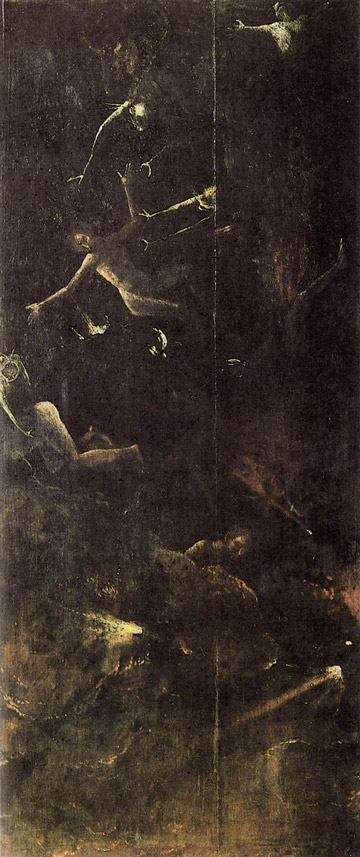The views expressed in our content reflect individual perspectives and do not represent the authoritative views of the Baha'i Faith.
Heaven did not seem to be my home; and I broke my heart with weeping to come back to earth; and the angels were so angry that they flung me out into the middle of the heath on the top of Wuthering Heights; where I woke sobbing for joy. – Emily Brontë.
The world’s artists have long utilized near-death experiences as powerful subjects for their art. Literally hundreds of books and films on the topic exist; and most tend to focus on the typical, positive near-death experience. Kenneth Ring, the well-known NDE researcher and author, synthesized the positive near-death experience into five specific stages:
A permeating sense of peace;
Separation from the physical body;
Entering darkness;
Seeing the light;
Entering the light.
While these stages only describe typical NDEs in a general way, they’ve come to be accepted, like Elizabeth Kubler-Ross’ five stages of grief, as describing the process most people usually go through when they temporarily visit the afterlife.
Darkness and Near-Death Experiences
But more recently, a new area of NDE research has begun to emerge—the study of the negative near-death experience. In 1982, the Gallup Organization polled people who had NDEs, and found that a significant minority (up to one-fifth of respondents) “felt uneasy, distressed or even terrified” by their experience.
Five years later, in 1985, a British psychologist named Margot Grey discovered similar findings when she studied NDEs in England. Grey identified five phases of a negative NDE:
Fear and panic;
An out-of-body experience;
Entering a black void;
Sensing an evil force;
Entering a “hellish” environment.
Grey’s study revealed that only a small minority of people (20% or less) who had an NDE went through a negative near-death experience—but those who did felt varying levels of anguish, desperation and desolation.
Then, in 2013, a group of American researchers led by Bruce Greyson and Nancy Bush interviewed fifty people who had negative NDEs, and concluded that common features included a lack of control, despair, a sense of existing in an eternal, gloomy dark void, and even menacing, hostile landscapes study participants described as “hellish” or “abysmal.” They felt foreboding, and saw other bitter, raging and frustrated souls. Surprisingly, though, the researchers heard very few accounts of what could be described as a conventional hell—no devils, demons, torture or eternal fiery torment.
Instead, they learned that most people who had negative NDEs felt an overwhelming sense of moral failure and remorse for their life choices. They experienced enormous anguish and agony because of their separation or distance from the light; and realized, often much later in their post-NDE life, that they needed to change their actions when they had negative consequences for others.
The Life Review, in both Positive and Negative NDEs
For centuries people who faced imminent death have said they saw their entire life flash before their eyes. In much the same way, many NDE veterans report going through a humbling “life review” during their experience. In the presence of the warm, bright light that many describe, they revisited their life’s moral decisions and evaluated, in the context of justice and kindness and their own conscience, the actions they took during their life on Earth. Some say they suffered enormous feelings of guilt, pain, remorse and regret while reviewing their lives. Many reveal that they understood, for the first time, their responsibility for their words and deeds, and their effect on the people around them. Many resolved, after their near-death experiences ended and their physical life resumed, that they would endeavor to change.
But no matter what the content of their near-death experience, whether primarily positive or negative, they overwhelmingly say they felt unconditional love during their life review—which later inspired and motivated many of them to become better people.
The Baha’i teachings affirm the basic spiritual framework of these near-death experiences. Baha’is see heaven not as a place, but as a state of nearness to the Creator; and see hell as an inner state of existential remoteness from that source of light. Each of those spiritual conditions comes as a result of our decisions and our deeds, what we do each moment to acquire or reject the spiritual virtues of love, peace, kindness and compassion that form the heart of the teachings of every great Faith.
Beyond that, Baha’u’llah wrote, the afterlife will always remain a mystery: “The nature of the soul after death can never be described.”
Because of that inherent mystery, the accounts of those who have near-death experiences can help provide a brief glimpse of what awaits us when this life bears us into the next. The Baha’i teachings say that the inevitable nature of our human transition to that stage of our existence means we should each review our lives every day, not just on the day we pass into the afterlife:
Bring thyself to account each day ere thou art summoned to a reckoning; for death, unheralded, shall come upon thee and thou shalt be called to give account for thy deeds. – Baha’u’llah, The Hidden Words, p. 11.
You May Also Like
Comments


















ou are doing justice to this fascinating topic. Keep up the good work.